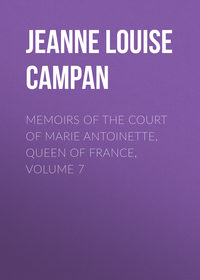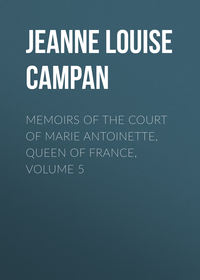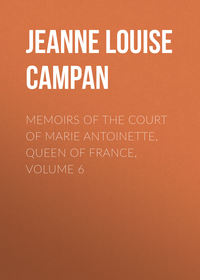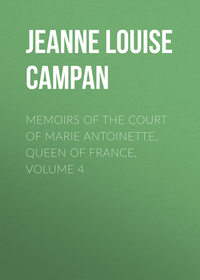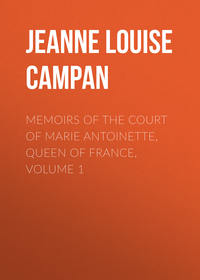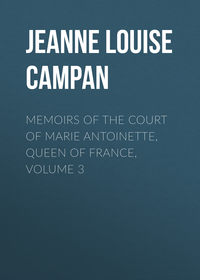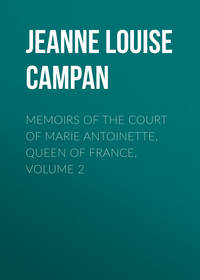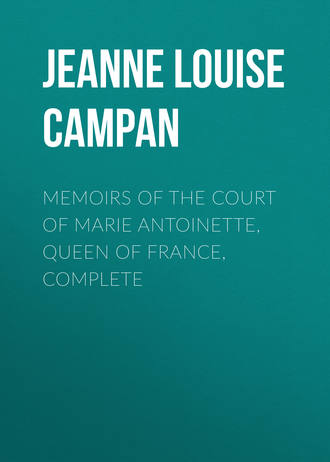 полная версия
полная версияMemoirs of the Court of Marie Antoinette, Queen of France, Complete
At this period an event with which I had nothing to do placed me in a still more critical situation. My brother, M. Genet, began his diplomatic career successfully. At eighteen he was attached to the embassy to Vienna; at twenty he was appointed chief secretary of Legation in England, on occasion of the peace of 1783. A memorial which he presented to M. de Vergennes upon the dangers of the treaty of commerce then entered into with England gave offence to M. de Calonne, a patron of that treaty, and particularly to M. Gerard de Rayneval, chief clerk for foreign affairs. So long as M. de Vergennes lived, having upon my father’s death declared himself the protector of my brother, he supported him against the enemies his views had created. But on his death M. de Montmorin, being much in need of the long experience in business which he found in M. de Rayneval, was guided solely by the latter. The office of which my brother was the head was suppressed. He then went to St. Petersburg, strongly recommended to the Comte de Segur, minister from France to that Court, who appointed him secretary of Legation. Some time afterwards the Comte de Segur left him at St. Petersburg, charged with the affairs of France. After his return from Russia, M. Genet was appointed ambassador to the United States by the party called Girondists, the deputies who headed it being from the department of the Gironde. He was recalled by the Robespierre party, which overthrew the former faction, on the 31st of May, 1793, and condemned to appear before the Convention. Vice-President Clinton, at that time Governor of New York, offered him an asylum in his house and the hand of his daughter, and M. Genet established himself prosperously in America.
When my brother quitted Versailles he was much hurt at being deprived of a considerable income for having penned a memorial which his zeal alone had dictated, and the importance of which was afterwards but too well understood. I perceived from his correspondence that he inclined to some of the new notions. He told me it was right he should no longer conceal from me that he sided with the constitutional party; that the King had in fact commanded it, having himself accepted the constitution; that he would proceed firmly in that course, because in this case disingenuousness would be fatal, and that he took that side of the question because he had had it proved to him that the foreign powers would not serve the King’s cause without advancing pretensions prompted by long-standing interests, which always would influence their councils; that he saw no salvation for the King and Queen but from within France, and that he would serve the constitutional King as he served him before the Revolution. And lastly, he requested me to impart to the Queen the real sentiments of one of his Majesty’s agents at a foreign Court. I immediately went to the Queen and gave her my brother’s letter; she read it attentively, and said, “This is the letter of a young man led astray by discontent and ambition; I know you do not think as he does; do not fear that you will lose the confidence of the King and myself.” I offered to discontinue all correspondence with my brother; she opposed that, saying it would be dangerous. I then entreated she would permit me in future to show her my own and my brother’s letters, to which she consented. I wrote warmly to my brother against the course he had adopted. I sent my letters by sure channels; he answered me by the post, and no longer touched upon anything but family affairs. Once only he informed me that if I should write to him respecting the affairs of the day he would give me no answer. “Serve your august mistress with the unbounded devotion which is due from you,” said he, “and let us each do our duty. I will only observe to you that at Paris the fogs of the Seine often prevent people from seeing that immense capital, even from the Pavilion of Flora, and I see it more clearly from St. Petersburg.” The Queen said, as she read this letter, “Perhaps he speaks but too truly; who can decide upon so disastrous a position as ours has become?” The day on which I gave the Queen my brother’s first letter to read she had several audiences to give to ladies and other persons belonging to the Court, who came on purpose to inform her that my brother was an avowed constitutionalist and revolutionist. The Queen replied, “I know it; Madame Campan has told me so.” Persons jealous of my situation having subjected me to mortifications, and these unpleasant circumstances recurring daily, I requested the Queen’s permission to withdraw from Court. She exclaimed against the very idea, represented it to me as extremely dangerous for my own reputation, and had the kindness to add that, for my sake as well as for her own, she never would consent to it. After this conversation I retired to my apartment. A few minutes later a footman brought me this note from the Queen: “I have never ceased to give you and yours proofs of my attachment; I wish to tell you in writing that I have full faith in your honour and fidelity, as well as in your other good qualities; and that I ever rely on the zeal and address you exert to serve me.”
[I had just received this letter from the Queen when M. de la Chapelle, commissary-general of the King’s household, and head of the offices of M. de Laporte, minister of the civil list, came to see me. The palace having been already sacked by the brigands on the 20th of June, 1792, he proposed that I should entrust the paper to him, that he might place it in a safer situation than the apartments of the Queen. When he returned into his offices he placed the letter she had condescended to write to me behind a large picture in his closet; but on the loth of August M. de la Chapelle was thrown into the prisons of the Abbaye, and the committee of public safety established themselves in his offices, whence they issued all their decrees of death. There it was that a villainous servant belonging to M. de Laporte went to declare that in the minister’s apartments, under a board in the floor, a number of papers would be found. They were brought forth, and M. de Laporte was sent to the scaffold, where he suffered for having betrayed the State by serving his master and sovereign. M. de la Chapelle was saved, as if by a miracle, from the massacres of the 2d of September. The committee of public safety having removed to the King’s apartments at the Tuileries, M. de la Chapelle had permission to return to his closet to take away some property belonging to him. Turning round the picture, behind which he had hidden the Queen’s letter, he found it in the place into which he had slipped it, and, delighted to see that I was safe from the ill consequences the discovery of this paper might have brought upon me, he burnt it instantly. In times of danger a mere nothing may save life or destroy it.—MADAME CAMPAN]
At the moment that I was going to express my gratitude to the Queen I heard a tapping at the door of my room, which opened upon the Queen’s inner corridor. I opened it; it was the King. I was confused; he perceived it, and said to me, kindly: “I alarm you, Madame Campan; I come, however, to comfort you; the Queen has told me how much she is hurt at the injustice of several persons towards you. But how is it that you complain of injustice and calumny when you see that we are victims of them? In some of your companions it is jealousy; in the people belonging to the Court it is anxiety. Our situation is so disastrous, and we have met with so much ingratitude and treachery, that the apprehensions of those who love us are excusable! I could quiet them by telling them all the secret services you perform for us daily; but I will not do it. Out of good-will to you they would repeat all I should say, and you would be lost with the Assembly. It is much better, both for you and for us, that you should be thought a constitutionalist. It has been mentioned to me a hundred times already; I have never contradicted it; but I come to give you my word that if we are fortunate enough to see an end of all this, I will, at the Queen’s residence, and in the presence of my brothers, relate the important services you have rendered us, and I will recompense you and your son for them.” I threw myself at the King’s feet and kissed his hand. He raised me up, saying, “Come, come, do not grieve; the Queen, who loves you, confides in you as I do.”
Down to the day of the acceptance it was impossible to introduce Barnave into the interior of the palace; but when the Queen was free from the inner guard she said she would see him. The very great precautions which it was necessary for the deputy to take in order to conceal his connection with the King and Queen compelled them to spend two hours waiting for him in one of the corridors of the Tuileries, and all in vain. The first day that he was to be admitted, a man whom Barnave knew to be dangerous having met him in the courtyard of the palace, he determined to cross it without stopping, and walked in the gardens in order to lull suspicion. I was desired to wait for Barnave at a little door belonging to the entresols of the palace, with my hand upon the open lock. I was in that position for an hour. The King came to me frequently, and always to speak to me of the uneasiness which a servant belonging to the Chateau, who was a patriot, gave him. He came again to ask me whether I had heard the door called de Decret opened. I assured him nobody had been in the corridor, and he became easy. He was dreadfully apprehensive that his connection with Barnave would be discovered. “It would,” said the King, “be a ground for grave accusations, and the unfortunate man would be lost.” I then ventured to remind his Majesty that as Barnave was not the only one in the secret of the business which brought him in contact with their Majesties, one of his colleagues might be induced to speak of the association with which they were honoured, and that in letting them know by my presence that I also was informed of it, a risk was incurred of removing from those gentlemen part of the responsibility of the secret. Upon this observation the King quitted me hastily and returned a moment afterwards with the Queen. “Give me your place,” said she; “I will wait for him in my turn. You have convinced the King. We must not increase in their eyes the number of persons informed of their communications with us.”
The police of M. de Laporte, intendant of the civil list, apprised him, as early as the latter end of 1791, that a man belonging to the King’s offices who had set up as a pastrycook at the Palais Royal was about to resume the duties of his situation, which had devolved upon him again on the death of one who held it for life; that he was so furious a Jacobin that he had dared to say it would be a good thing for France if the King’s days were shortened. His duty was confined to making the pastry; he was closely watched by the head officers of the kitchen, who were devoted to his Majesty; but it is so easy to introduce a subtle poison into made dishes that it was determined the King and Queen should eat only plain roast meat in future; that their bread should be brought to them by M. Thierry de Ville-d’Avray, intendant of the smaller apartments, and that he should likewise take upon himself to supply the wine. The King was fond of pastry; I was directed to order some, as if for myself, sometimes of one pastry-cook, and sometimes of another. The pounded sugar, too, was kept in my room. The King, the Queen, and Madame Elisabeth ate together, and nobody remained to wait on them. Each had a dumb waiter and a little bell to call the servants when they were wanted. M. Thierry used himself to bring me their Majesties’ bread and wine, and I locked them up in a private cupboard in the King’s closet on the ground floor. As soon as the King sat down to table I took in the pastry and bread. All was hidden under the table lest it might be necessary to have the servants in. The King thought it dangerous as well as distressing to show any apprehension of attempts against his person, or any mistrust of his officers of the kitchen. As he never drank a whole bottle of wine at his meals (the Princesses drank nothing but water), he filled up that out of which he had drunk about half from the bottle served up by the officers of his butlery. I took it away after dinner. Although he never ate any other pastry than that which I brought, he took care in the same manner that it should seem that he had eaten of that served at table. The lady who succeeded me found this duty all regulated, and she executed it in the same manner; the public never was in possession of these particulars, nor of the apprehensions which gave rise to them. At the end of three or four months the police of M. de Laporte gave notice that nothing more was to be dreaded from that sort of plot against the King’s life; that the plan was entirely changed; and that all the blows now to be struck would be directed as much against the throne as against the person of the sovereign.
There are others besides myself who know that at this time one of the things about which the Queen most desired to be satisfied was the opinion of the famous Pitt. She would sometimes say to me, “I never pronounce the name of Pitt without feeling a chill like that of death.” (I repeat here her very expressions.) “That man is the mortal enemy of France; and he takes a dreadful revenge for the impolitic support given by the Cabinet of Versailles to the American insurgents. He wishes by our destruction to guarantee the maritime power of his country forever against the efforts made by the King to improve his marine power and their happy results during the last war. He knows that it is not only the King’s policy but his private inclination to be solicitous about his fleets, and that the most active step he has taken during his whole reign was to visit the port of Cherbourg. Pitt had served the cause of the French Revolution from the first disturbances; he will perhaps serve it until its annihilation. I will endeavour to learn to what point he intends to lead us, and I am sending M.– to London for that purpose. He has been intimately connected with Pitt, and they have often had political conversations respecting the French Government. I will get him to make him speak out, at least so far as such a man can speak out.” Some time afterwards the Queen told me that her secret envoy was returned from London, and that all he had been able to wring from Pitt, whom he found alarmingly reserved, was that he would not suffer the French monarchy to perish; that to suffer the revolutionary spirit to erect an organised republic in France would be a great error, affecting the tranquillity of Europe. “Whenever,” said she, “Pitt expressed himself upon the necessity of supporting monarchy in France, he maintained the most profound silence upon what concerns the monarch. The result of these conversations is anything but encouraging; but, even as to that monarchy which he wishes to save, will he have means and strength to save it if he suffers us to fall?”
The death of the Emperor Leopold took place on the 1st of March, 1792. When the news of this event reached the Tuileries, the Queen was gone out. Upon her return I put the letter containing it into her hands. She exclaimed that the Emperor had been poisoned; that she had remarked and preserved a newspaper, in which, in an article upon the sitting of the Jacobins, at the time when the Emperor Leopold declared for the coalition, it was said, speaking of him, that a pie-crust would settle that matter. At this period Barnave obtained the Queen’s consent that he should read all the letters she should write. He was fearful of private correspondences that might hamper the plan marked out for her; he mistrusted her Majesty’s sincerity on this point; and the diversity of counsels, and the necessity of yielding, on the one hand, to some of the views of the constitutionalists, and on the other, to those of the French Princes, and even of foreign Courts, were unfortunately the circumstances which most rapidly impelled the Court towards its ruin.
However, the emigrants showed great apprehensions of the consequences which might follow in the interior from a connection with the constitutionalists, whom they described as a party existing only in idea, and totally without means of repairing their errors. The Jacobins were preferred to them, because, said they, there would be no treaty to be made with any one at the moment of extricating the King and his family from the abyss in which they were plunged.
CHAPTER VII
In the beginning of the year 1792, a worthy priest requested a private interview with me. He had learned the existence of a new libel by Madame de Lamotte. He told me that the people who came from London to get it printed in Paris only desired gain, and that they were ready to deliver the manuscript to him for a thousand louis, if he could find any friend of the Queen disposed to make that sacrifice for her peace; that he had thought of me, and if her Majesty would give him the twenty-four thousand francs, he would hand the manuscript to me.
I communicated this proposal to the Queen, who rejected it, and desired me to answer that at the time when she had power to punish the hawkers of these libels she deemed them so atrocious and incredible that she despised them too much to stop them; that if she were imprudent and weak enough to buy a single one of them, the Jacobins might possibly discover the circumstance through their espionage; that were this libel brought up, it would be printed nevertheless, and would be much more dangerous when they apprised the public of the means she had used to suppress it.
Baron d’Aubier, gentleman-in-ordinary to the King, and my particular friend, had a good memory and a clear way of communicating the substance of the debates and decrees of the National Assembly. I went daily to the Queen’s apartments to repeat all this to the King, who used to say, on seeing me, “Ah! here’s the Postillon par Calais,”—a newspaper of the time.
M. d’Aubier one day said to me: “The Assembly has been much occupied with an information laid by the workmen of the Sevres manufactory. They brought to the President’s office a bundle of pamphlets which they said were the life of Marie Antoinette. The director of the manufactory was ordered up to the bar, and declared he had received orders to burn the printed sheets in question in the furnaces used for baking his china.”
While I was relating this business to the Queen the King coloured and held his head down over his plate. The Queen said to him, “Do you know anything about this, Sire?” The King made no answer. Madame Elisabeth requested him to explain what it meant. Louis was still silent. I withdrew hastily. A few minutes afterwards the Queen came to my room and informed me that the King, out of regard for her, had purchased the whole edition struck off from the manuscript which I had mentioned to her, and that M. de Laporte had not been able to devise any more secret way of destroying the work than that of having it burnt at Sevres, among two hundred workmen, one hundred and eighty of whom must, in all probability, be Jacobins! She told me she had concealed her vexation from the King; that he was in consternation, and that she could say nothing, since his good intentions and his affection for her had been the cause of the mistake.
[M. de Laporte had by order of the King bought up the whole edition of the “Memoirs” of the notorious Madame de Lamotte against the Queen. Instead of destroying them immediately, he shut them up in one of the closets in his house, The alarming and rapid growth of the rebellion, the arrogance of the crowd of brigands, who in great measure composed the populace of Paris, and the fresh excesses daily resulting from it, rendered the intendant of the civil list apprehensive that some mob might break into his house, carry off these “Memoirs,” and spread them among the public. In order to prevent this he gave orders to have the “Memoirs” burnt with every necessary precaution; and the clerk who received the order entrusted the execution of it to a man named Riston, a dangerous Intriguer, formerly an advocate of Nancy, who had a twelve-month before escaped the gallows by favour of the new principles and the patriotism of the new tribunals, although convicted of forging the great seal, and fabricating decrees of the council. This Riston, finding himself entrusted with a commission which concerned her Majesty, and the mystery attending which bespoke something of importance, was less anxious to execute it faithfully than to make a parade of this mark of confidence. On the 30th of May, at ten in the morning, he had the sheets carried to the porcelain manufactory at Sevres, in a cart which he himself accompanied, and made a large fire of them before all the workmen, who were expressly forbidden to approach it. All these precautions, and the suspicions to which they gave rise, under such critical circumstances, gave so much publicity to this affair that it was denounced to the Assembly that very night. Brissot, and the whole Jacobin party, with equal effrontery and vehemence, insisted that the papers thus secretly burnt could be no other than the registers and documents of the correspondence of the Austrian committee. M. de Laporte was ordered to the bar, and there gave the most precise account of the circumstances. Riston was also called up, and confirmed M. de Laporte’s deposition. But these explanations, however satisfactory, did not calm the violent ferment raised in the Assembly by this affair.—“Memoirs of Bertrand de Molleville.”]
Some time afterwards the Assembly received a denunciation against M. de Montmorin. The ex-minister was accused of having neglected forty despatches from M. Genet, the charge d’affaires from France in Russia, not having even unsealed them, because M. Genet acted on constitutional principles. M. de Montmorin appeared at the bar to answer this accusation. Whatever distress I might feel in obeying the order I had received from the King to go and give him an account of the sitting, I thought I ought not to fail in doing so. But instead of giving my brother his family name, I merely said “your Majesty’s charge d’affaires at St. Petersburg.”
The King did me the favour to say that he noticed a reserve in my account, of which he approved. The Queen condescended to add a few obliging remarks to those of the King. However, my office of journalist gave me in this instance so much pain that I took an opportunity, when the King was expressing his satisfaction to me at the manner in which I gave him this daily account, to tell him that its merits belonged wholly to M. d’Aubier; and I ventured to request the King to suffer that excellent man to give him an account of the sittings himself. I assured the King that if he would permit it, that gentleman might proceed to the Queen’s apartments through mine unseen; the King consented to the arrangement. Thenceforward M. d’Aubier gave the King repeated proofs of zeal and attachment.
The Cure of St. Eustache ceased to be the Queen’s confessor when he took the constitutional oath. I do not remember the name of the ecclesiastic who succeeded him; I only know that he was conducted into her apartments with the greatest mystery. Their Majesties did not perform their Easter devotions in public, because they could neither declare for the constitutional clergy, nor act so as to show that they were against them.
The Queen did perform her Easter devotions in 1792; but she went to the chapel attended only by myself. She desired me beforehand to request one of my relations, who was her chaplain, to celebrate a mass for her at five o’clock in the morning. It was still dark; she gave me her arm, and I lighted her with a taper. I left her alone at the chapel door. She did not return to her room until the dawn of day.
Dangers increased daily. The Assembly were strengthened in the eyes of the people by the hostilities of the foreign armies and the army of the Princes. The communication with the latter party became more active; the Queen wrote almost every day. M. de Goguelat possessed her confidence for all correspondence with the foreign parties, and I was obliged to have him in my apartments; the Queen asked for him very frequently, and at times which she could not previously appoint.
All parties were exerting themselves either to ruin or to save the King. One day I found the Queen extremely agitated; she told me she no longer knew where she was; that the leaders of the Jacobins offered themselves to her through the medium of Dumouriez; or that Dumouriez, abandoning the Jacobins, had come and offered himself to her; that she had granted him an audience; that when alone with her, he had thrown himself at her feet, and told her that he had drawn the ‘bonnet rouge’ over his head to the very ears; but that he neither was nor could be a Jacobin; that the Revolution had been suffered to extend even to that rabble of destroyers who, thinking of nothing but pillage, were ripe for anything, and might furnish the Assembly with a formidable army, ready to undermine the remains of a throne already but too much shaken. Whilst speaking with the utmost ardour he seized the Queen’s hand and kissed it with transport, exclaiming, “Suffer yourself to be saved!” The Queen told me that the protestations of a traitor were not to be relied on; that the whole of his conduct was so well known that undoubtedly the wisest course was not to trust to it; that, moreover, the Princes particularly recommended that no confidence should be placed in any proposition emanating from within the kingdom; that the force without became imposing; and that it was better to rely upon their success, and upon the protection due from Heaven to a sovereign so virtuous as Louis XVI. and to so just a cause.


